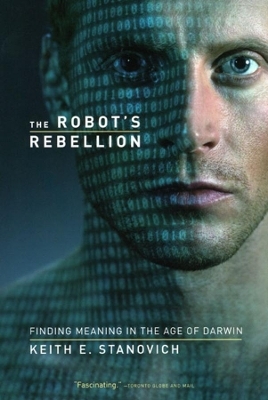
The Robot's Rebellion
Finding Meaning in the Age of Darwin
Seiten
2005
University of Chicago Press (Verlag)
978-0-226-77125-0 (ISBN)
University of Chicago Press (Verlag)
978-0-226-77125-0 (ISBN)
- Lieferbar (Termin unbekannt)
- Portofrei ab CHF 40
- Auch auf Rechnung
- Artikel merken
Provides the tools for the robot's rebellion, a program of cognitive reform necessary to advance human interests over the interest of the replicators. The author shows how concepts of rational thinking from cognitive science interact with the logic of evolution to create opportunities for humans to structure their behavior to serve their own ends.
The idea that we might be robots is no longer the stuff of science fiction; decades of research in evolutionary biology and cognitive science have led many esteemed thinkers and scientists to the conclusion that, following the precepts of universal Darwinism, humans are merely the hosts for two replicators (genes and memes) that have no interest in us except as conduits for replication. Accepting and now forcefully responding to this disturbing idea that precludes the possibilities of morality or free will, among other things, Keith Stanovich here provides the tools for the "robot's rebellion," a program of cognitive reform necessary to advance human interests over the limited interest of the replicators. He shows how concepts of rational thinking from cognitive science interact with the logic of evolution to create opportunities for humans to structure their behavior to serve their own ends. These evaluative activities of the brain, he argues, fulfill the need that we have to ascribe significance to human life.
Only by recognizing ourselves as robots, argues Stanovich, can we begin to construct a concept of self based on what is truly singular about humans: that they gain control of their lives in a way unique among life forms on Earth - through rational self-determination.
The idea that we might be robots is no longer the stuff of science fiction; decades of research in evolutionary biology and cognitive science have led many esteemed thinkers and scientists to the conclusion that, following the precepts of universal Darwinism, humans are merely the hosts for two replicators (genes and memes) that have no interest in us except as conduits for replication. Accepting and now forcefully responding to this disturbing idea that precludes the possibilities of morality or free will, among other things, Keith Stanovich here provides the tools for the "robot's rebellion," a program of cognitive reform necessary to advance human interests over the limited interest of the replicators. He shows how concepts of rational thinking from cognitive science interact with the logic of evolution to create opportunities for humans to structure their behavior to serve their own ends. These evaluative activities of the brain, he argues, fulfill the need that we have to ascribe significance to human life.
Only by recognizing ourselves as robots, argues Stanovich, can we begin to construct a concept of self based on what is truly singular about humans: that they gain control of their lives in a way unique among life forms on Earth - through rational self-determination.
Keith E. Stanovich holds the Canada Research Chair in Applied Cognitive Science at the University of Toronto. A fellow of the American Psychological Association and the American Psychological Society, he is the author of Who Is Rational? Studies of Individual Differences in Reasoning and How to Think Straight About Psychology, now in its seventh edition.
| Erscheint lt. Verlag | 18.10.2005 |
|---|---|
| Sprache | englisch |
| Maße | 15 x 23 mm |
| Gewicht | 567 g |
| Themenwelt | Geisteswissenschaften ► Psychologie ► Verhaltenstherapie |
| Naturwissenschaften ► Biologie ► Evolution | |
| Naturwissenschaften ► Biologie ► Humanbiologie | |
| Sozialwissenschaften ► Ethnologie | |
| Sozialwissenschaften ► Soziologie | |
| ISBN-10 | 0-226-77125-3 / 0226771253 |
| ISBN-13 | 978-0-226-77125-0 / 9780226771250 |
| Zustand | Neuware |
| Haben Sie eine Frage zum Produkt? |
Mehr entdecken
aus dem Bereich
aus dem Bereich
Verhaltensanalyse - Behandlungsplan - Bericht an den Gutachter
Buch | Softcover (2022)
Kohlhammer (Verlag)
CHF 48,95
psychodynamisch denken – verhaltenstherapeutisch handeln
Buch | Hardcover (2023)
Schattauer (Verlag)
CHF 67,20


